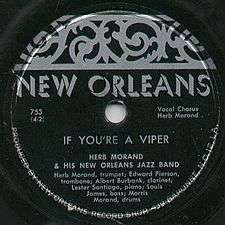New Orleans Records
New Orleans Records was an American record label based in New Orleans, Louisiana and active from 1949 until the early 1980s. Originally founded by Orin Blackstone in 1949 and revived by Clive Wilson in 1972, the label specialized in New Orleans jazz.

History
The New Orleans Records label was founded and originally run by the writer and jazz discographer Orin Blackstone (1907-1980). It was based in the book and record shop which Blackstone owned with his brother Harvey at 439 Baronne Street in New Orleans.[1][2] The shop was also known for its backroom jam sessions where musicians including Raymond Burke and George Girard would play. One of the earliest recordings on the New Orleans label was Johnny Wiggs performing "Bourbon Street Bounce" which had been written by Harvey Blackstone. According to Charles Suhor in Jazz in New Orleans:The Postwar Years, the recording became a surprise hit on local radio.[3]
Financial troubles forced the closure of the Blackstone record shop in the early 1950s, and Orin Blackstone eventually moved to Slidell, Louisiana where he became the editor of the Slidell-St. Tammany Times. In 1972, the British jazz trumpeter Clive Wilson, who had settled in New Orleans in 1964, revived the label. Their first release was Thomas Valentine at Kohlman's Tavern.[2][4] Under Wilson the label recorded performances by Herb Hall, Frog Joseph, Dave "Fat Man" Williams, and Jeanette Kimball. Among the label's releases in the early 1980s was Kimball's Sophisticated Lady.[5][6] Other New Orleans jazz musicians who recorded for New Orleans Records included Armand Hug,[7] Raymond Burke, and Emanuel Paul.[8]
Early discography
- 751 – Johnny Wiggs & His New Orleans Music: "Ultra Canal" / "Two Wing Temple In The Sky" (1949)[9]
- 752 – Johnny Wiggs & His New Orleans Music: "Bourbon Street Bounce"/"Congo Square" (1949)[10]
- 753 – Herb Morand & His New Orleans Jazz Band: "Down In Honky Tonk Town" / "If You're a Viper" (1950)[11]
See also
- List of record labels
References
- Gart, Galen (1989). The American Record Label Directory and Dating Guide, 1940-1959. Milford, New Hampshire: Big Nickel Publications. p. 152. ISBN 0-936433-11-6.
- Epperson, Bruce D. (2013). More Important Than the Music: A History of Jazz Discography, pp. 62–63. University of Chicago Press. ISBN 022606767X
- Suhor, Charles (2001). Jazz in New Orleans: The Postwar Years Through 1970, pp. 2, 128. Scarecrow Press. ISBN 1461660025
- s.n. (Winter 1973). "New Orleans Label Revived". The Second Line, p. 11
- Sancton, Tom. Foreword in Wilson, Clive (2019). Time of My Life: A Jazz Journey from London to New Orleans, p. 8 (electronic edition). University Press of Mississippi. ISBN 1496821181
- OCLC 884021759
- s.n. (1977). "Armand Hug". Down Beat, Vol. 44, p. 11
- Laing, Ralph (1981). Jazz Records, The Specialist Labels: M-Z, p. 390. Jazz/Media ApS. ISBN 8788043010
- National Museum of American History. "Ultra Canal; Two Wing Temple in the Sky"
- National Museum of American History. "Congo Square; Bourbon St. Bounce"
- National Museum of American History."Down in Honky Tonk Town; If You're a Viper"
External Links
- New Orleans Records on the Internet Archive's Great 78 Project